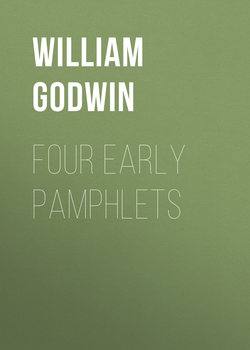Four Early Pamphlets

Реклама. ООО «ЛитРес», ИНН: 7719571260.
Оглавление
William Godwin. Four Early Pamphlets
A DEFENCE OF THE ROCKINGHAM PARTY, IN THEIR LATE COALITION WITH THE RIGHT HONOURABLE FREDERIC LORD NORTH
INSTRUCTIONS TO A STATESMAN. HUMBLY INSCRIBED TO THE RIGHT HONOURABLE GEORGE EARL TEMPLE
AN ACCOUNT OF THE SEMINARY That will be opened On MONDAY the Fourth Day of AUGUST, At EPSOM in SURREY, For the INSTRUCTION of TWELVE PUPILS IN The GREEK, LATIN, FRENCH, and ENGLISH Languages
THE HERALD OF LITERATURE
ARTICLE I. THE HISTORY OF THE DECLINE AND FALL OF THE ROMAN EMPIRE. BY EDWARD GIBBON, ESQ. VOLS. IV, V, VI, VII. 4TO
ARTICLE II. THE HISTORY OF AMERICA. BY WILLIAM ROBERTSON, D.D.&C. VOLS. III, IV. 4TO
ARTICLE III. SECRET HISTORY OF THEODORE ALBERT MAXIMILIAN, PRINCE OF HOHENZOLLERN SIGMARINGEN. 12MO
ARTICLE IV. LOUISA, OR MEMOIRS OF A LADY OF QUALITY. BY THE AUTHOR OF EVELINA AND CECILIA. 3 VOLS. 12MO
ARTICLE V. THE PEASANT OF BILIDELGERID, A TALE
ARTICLE VI. AN ESSAY ON NOVEL, IN THREE EPISTLES INSCRIBED TO THE RIGHT HONOURABLE LADY CRAVEN, BY WILL. HAYLEY, ESQ. 4TO
ARTICLE VII. INKLE AND YARICO, A POEM, BY JAMES BEATTIE, L.L.D. 4TO
ARTICLE VIII THE ALCHYMIST, A COMEDY, ALTERED FROM BEN JONSON, BY RICHARD BRINSLEY SHERIDAN, ESQ
ARTICLE IX. REFLEXIONS UPON THE PRESENT STATE OF THE UNITED STATES OF AMERICA. BY THOMAS PAINE, M.A. &c. 8vo
ARTICLE X. SPEECH OF THE RIGHT HONOURABLE EDMUND BURKE, ON A MOTION FOR AN ADDRESS OF THANKS TO HIS MAJESTY (ON THE 28TH OF NOVEMBER, 1783) FOR HIS GRACIOUS COMMUNICATION OF A TREATY OF COMMERCE CONCLUDED BETWEEN GEORGE THE THIRD, KING, &C. AND THE UNITED STATES OF AMERICA
Отрывок из книги
MY LORD,
The following papers fell into my hands by one of those unaccountable accidents, so frequent in human life, but which in the relation appear almost incredible. I will not however trouble your lordship with the story. If they be worthy of the press, it is of no great consequence to the public how they found their way thither. If they afford your lordship a moment's amusement, amidst the weightier cares incident to your rank and fortune, I have obtained my end.
.....
I shall confine myself, my lord, in the few thoughts I mean to suggest upon this head, to your two more immediate ancestors, men distinguished above the common rate, by their virtues or their abilities. Richard earl Temple, your lordship's immediate predecessor, as the representative of your illustrious house, will be long remembered by posterity under the very respectable title of the friend of the earl of Chatham. But though his friend, my lord, we well know that he did not implicitly follow the sentiments of a man, who was assuredly the first star in the political hemisphere, and whose talents would have excused, if any thing could have excused, an unsuspecting credulity. The character of lord Chatham was never, but in one instance, tarnished. He did not sufficiently dread the omnipotence of the favourite. He fondly imagined that before a character so brilliant, and success so imposing as his had been, no little system of favouritism could keep its ground. Twice, my lord, he was upon the brink of the precipice, and once he fell. When he trembled on the verge, who was it that held him back? It was Richard earl Temple. Twice he came, like his guardian angel, and snatched him from his fate. Lord Chatham indeed was formed to champ the bit, and spurn indignant at every restraint. He knew the superiority of his abilities, he recollected that he had twice submitted to the honest counsels of his friend, and he disdained to listen any longer to a coolness, that assimilated but ill to the adventurousness of his spirit; and to a hesitation, that wore in his apprehension the guise of timidity. What then did Richard earl Temple do? There he fixed his standard, and there he pitched his tent. Not a step farther would he follow a leader, whom to follow had been the boast of his life. He erected a fortress that might one day prove the safeguard of his misguided and unsuspecting friend.
And yet, my lord, the character of Richard earl Temple, was not that of causeless suspicion. He proved himself, in a thousand instances, honest, trusting, and sincere. He was not, like some men, that you and I know, dark, dispassionate, and impenetrable. On the contrary, no man mistook him, no man ever charged him with a double conduct or a wrinkled heart. His countenance was open, and his spirit was clear. He was a man of passions, my lord. He acted in every momentous concern, more from the dictates of his heart, than his head. But this is the key to his conduct; He kept a watchful eye upon that bane of every patriot minister, secret influence. If there were one feature in his political history more conspicuous than the rest, if I were called to point out the line of discrimination between his character and that of his contemporaries upon the public stage, it would be the hatred of secret influence.
.....